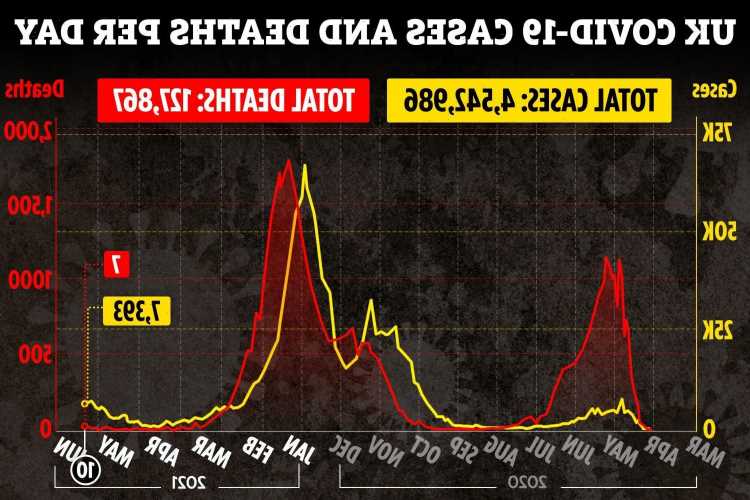COVID cases have today continued to climb with more than 7,000 infections recorded for the second day in a row.
Official statistics released this afternoon show seven people have died and 7,393 have tested positive across Britain in the past 24 hours.
🔵 Read our coronavirus live blog for the latest updates
It comes as yesterday the highest number of cases was recorded with 7,540 people testing positive and six deaths.
There has been a rise of 40 per cent in the number of cases since last week when 5,274 cases were recorded.
The UK last saw a similar rise on December 22, when cases almost doubled to 36,000 in seven days.
However, the number of deaths remains low as last Thursday, 18 deaths were reported.
A total of 4,542,986 people have caught the virus in Britain while 127,867 have died since the start of the pandemic.
It comes as new data has revealed that the Indian variant has now spread to all parts of the country and is now dominant in the UK, making up 91 per cent of cases, according to Health Secretary Matt Hancock.
In just two weeks, the strain went from a proportion of 38 per cent to 75 per cent, making it dominant in England.
Earlier this week Matt Hancock warned the Indian Covid strain is 40 per cent more transmissible than other Covid variants.
The Health Secretary added that the spread of the variant had made the decisions behind the June 21 unlocking "more difficult" as he confirmed the latest advice is that the Delta mutation is more infectious than other strains.
Prof "Lockdown" Neil Ferguson has warned the R rate in parts of England is as high as 2.5 due to the Delta variant, which is 60 per cent more transmissible.
Meanwhile, nine places in the UK have seen cases rising likely driven by the Delta variant.
Stirling, Manchester, Rochdale, Bolton, Kirklees, Lancashire, St Helens, Renfrewshire and East Dunbartonshire are those that saw Covid prevalence rise in the past week.
Blackburn with Darwen in Lancashire continues to have the highest rate of infections in the country, with 867 new cases in the seven days to June 5 – the equivalent of 579.2 cases per 100,000 people.
This is up from 438.9 in the seven days to May 29.
Rossendale in Lancashire has the second highest rate, up slightly from 312.0 to 320.4, with 229 new cases.
Bolton in Greater Manchester has the third highest, down from 378.4 to 310.6, with 893 new cases.
Experts have said it is now evident the UK is at the start of a third wave and things would only escalate if June 21 went ahead.
The data comes amid growing pressure to delay England's Freedom Day amid fears Boris Johnson was considering up to a month-long delay to his roadmap.
Good Morning Britain's Dr Hilary Jones has called for the delay of the lift of the lockdown, saying "things are getting worse".
Brits will find out on Monday if "Freedom Day" is going ahead, the Health Secretary said as ministers need more time before making a decision.
Meanwhile, a total of 69,743,980 people have received their first dose of the Covid-19 vaccine.
Earlier this week a record one million jabs were booked by young people keen to get life back to normal.
Youngsters booked more than 750 appointments per minute after vaccines rolled out to the 25-29 age group.
Source: Read Full Article




